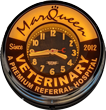Kennel Cough is one of the most common infectious diseases that affect our canine friends. Cats can get their own versions of respiratory diseases, but they are very unlikely to get an infection from dogs.
First of all- what is it? The very words “kennel” and “cough” lead many pet parents to think that it only affects dogs that have recently been in a kennel and that it only causes a cough.
In reality, dogs can get kennel cough during their walks around the block, at the dog park, from a friendly dog while camping and any other time that their dog meets an infected dog (and don’t be angry – dogs are most contagious 1 to 3 days before they show signs- so their owners don’t even know to keep them home) or is in the same area a short time after an infected dog.
And while signs usually start with the characteristic persistent honking cough, we see many other signs such as decreased activity and appetite, runny nose and/or watery eyes. It can also cause painful swallowing (like a person with strep. throat) and retching to the point of vomiting up food or bile. Sadly, it can also progress to causing difficulty in breathing (usually due to pneumonia) and in rare cases even cause your dog to die.
Dogs can also get kennel cough even if they are vaccinated – there are about 9 viruses and 4 bacteria that can cause the signs of kennel cough. You have possibly heard of some of the more common causes of kennel cough during visits with your veterinarian, because they are included in the vaccines your dog gets – distemper, canine adenovirus and canine parainfluenza (all included in the DA2PP vaccine) and Bordetella (the “kennel cough” shot). We also have vaccines for two strains of canine influenza – these are not routinely given everywhere but are more commonly given in areas of higher risk for the canine flu. But we don’t have vaccines for about one-half of the viruses and most of the bacteria – and, other than the distemper vaccine, all the vaccines only reduce signs but don’t completely stop the infection from starting in the first place.
Given all these convolutions it is little wonder that kennel cough is now called Canine Infectious Respiratory Disease Complex (CIRDC) by veterinarians, and I’ll refer to kennel cough as CIRDC for the rest of this blog.
Given the complexity of CIRDC, how do we actually know your pet has it? We start with a thorough history – where has your dog been within the last 10 days or so, what contact have they had with other dogs (or even other people who have dogs at home), does your pet have other conditions (for example: heart disease, bronchitis), what medications are they on and other factors that might affect your dog’s ability to fight the disease off.
After the history taking is completed we then do a complete physical exam including listening to your dog’s heart and lungs with a stethoscope. At some point we will also gently squeeze your dog’s trachea – this might cause your dog to cough. This is admittedly a simple test but it can tell us whether or not your dog’s trachea is inflamed. CIRDC is the most likely cause of this tracheal inflammation, but there are others (including collapsing trachea and cancer) that can mimic each other. We might recommend chest X-rays and / or a PCR test or a bacterial culture but typically don’t for most simple cases. For patients that don’t respond like we expect them to we might recommend anesthesia and a bronchoscopy – a procedure that uses a tiny camera to evaluate the trachea and the air tubes inside the lungs.
Given the variety of organisms that can cause CIRDC and the overlap with other, potentially more serious causes of coughing it is important to have your pet evaluated by your veterinarian whenever they develop a persistent cough, retch or their appetite and thirst decrease. If your dog has more serious complications from kennel cough and needs more intense / overnight care including oxygen support or needs more advanced testing, like the bronchoscopy, then your regular veterinarian will possibly refer you to a specialty hospital that can perform those tests. At MarQueen Veterinary Specialty and ER Group in Upland we are fully capable of providing the more advanced, 24/7 care that your pet might need and can perform the additional diagnostics to figure out what exactly is causing your pet’s problems and, more importantly, do what is needed to do to get them back to being as healthy and active as possible.






Leave A Comment